The best and worst times to buy a car amid EV trends and supply-chain woes
Buying a car can be overwhelming and stressful under normal circumstances, but with the ongoing supply chain backlog, experts say consumers might have to lower their expectations when it comes to finding the perfect vehicle.
But it is not all doom and gloom if you’re ready to buy, whether new or used. The basic car-buying principles still apply, even during these times of inflation.
Ivan Drury is a senior manager at Edmunds, an automotive website that covers everything from test drives to reviews of cars and even dealerships. He says simply: Don’t wait until the last minute, and do your homework.
Plan ahead
Drury advises consumers that if they might be considering buying a car, whether it’s one or two years from now, start your research as soon as possible.
"The last moment," Drury said laughing, "I don’t care what time of the year, the worst time to buy is when you have had a vehicle that is either dead or you have suddenly realized, ‘I need transportation tomorrow, other than what I currently have.’"
Drury acknowledged that sometimes people can’t plan for when their car decides to unexpectedly die on them, but the farther you plan, the better your car-buying experience will be.
"And that is the case for not just somebody who has a lease, but for anybody who is even flirting with the idea of buying a car new, used, if you’re changing segments. If you used to drive a sedan and you’re thinking about an SUV, think about it as soon as possible," Drury said.
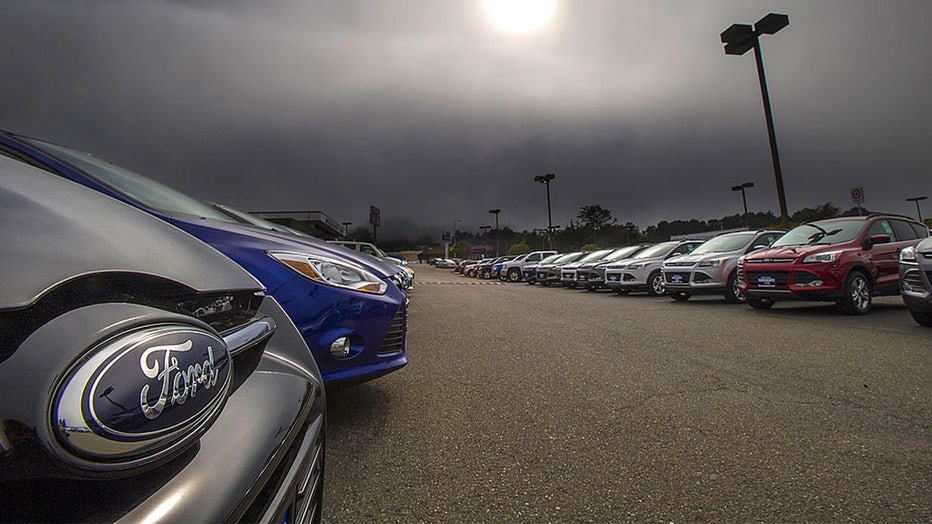
FILE - New cars sit on display for sale at the Serramonte Ford Motor Co. dealership. (David Paul Morris/Bloomberg via Getty Images)
What is the best (and worst) time of year to buy a car
"That depends on how you want to look at ‘best,’" Drury offered. "It’s an interesting situation. If you wait till the end of the year, selection is slim, discounts begin. But, at the same time, if you’re a picky buyer, you like certain colors, you like certain options, do not buy then because you’ll be jammed up. You’re going to find that the vehicle you like might be discounted but when it’s missing that crucial component to your enjoyment and you’re spending $40,000, then you’re actually not saving any money."
Christmas and New Year
Drury said the time between Christmas and New Year is one of the busiest times of the year to buy because of the long-standing advice from past car-buying experts. So while you might get a discount, you will probably have a terrible customer service experience and you will need to settle on a car that meets just a few of your expectations as opposed to all.
"They get so many phone calls, texts, and emails that, if you go and you want to have a good customer experience, don’t expect one. Just expect it to be super transactional, super fast, which is fine for some people, especially if you’re like, ‘Look, I don’t care about color, I don’t care about content, I just want a car.’ You can shop during that time of year - it is going to be hectic," Drury warned.
Mid-January and February
But on the same hand, Drury said going car shopping between Christmas and New Year isn’t completely necessary to buy your dream car at a good price. Just wait until later in January or even February.
"Those prior-model year vehicles, they don’t suddenly sell out at the end of the year. I think it’s a common misconception that suddenly inventory disappears; January 21, there’s not more of the prior-model year. That’s not the case. In a typical year, you’ll see 20% or 30% of cars sold in January still from last year. In February, you’ll still see it at around 10 or 15%," Drury continued.
So don’t stress yourself out by rushing to the dealership during that short timeframe, Drury advises, you’ll probably still find the car you’ve been wanting and still get the accompanying discount.
What time of the month should you buy?
If you aren’t looking to buy a car during the busy holidays, another smart time to buy is at the beginning of the month, Drury advised.
"There’s always incentive programs that come out at the beginning of the month. You can find out if those incentives appeal to you. And then, when is it typically best to buy and actually transact based upon those incentives would be the end of the month. That is when dealerships try to meet their quota, salesmen are trying to meet their quota. Sometimes, they’ll be a little more flexible on price," Drury said.
Consider the redesign
One other interesting aspect to consider when you’re buying a new car and want to optimize on getting the newest look, remember to search when or if the carmaker is issuing a redesign in the near future.
"If next year’s model is the new fancy version, well guess what, wait till they’re clearing out the current model new vehicle. I’ve done it myself; you save a lot of money if you just know the product cadence. Most cars are redesigned every six years. So that’s something to keep an eye on," according to Drury.
A quick Google search will give you the answer to when the next redesign of your dream car will come out and you can plan your car-buying options accordingly, Drury advised.
However, if a buyer is unable to time when they need to purchase a new car with the launch of a redesign and instead that particular design is going to die, Drury said that’s an even more perfect time to buy.
Discontinued models mean more discounts because automakers don’t want those cars sitting in their lots and will try to get rid of them to make room for the newer designs.
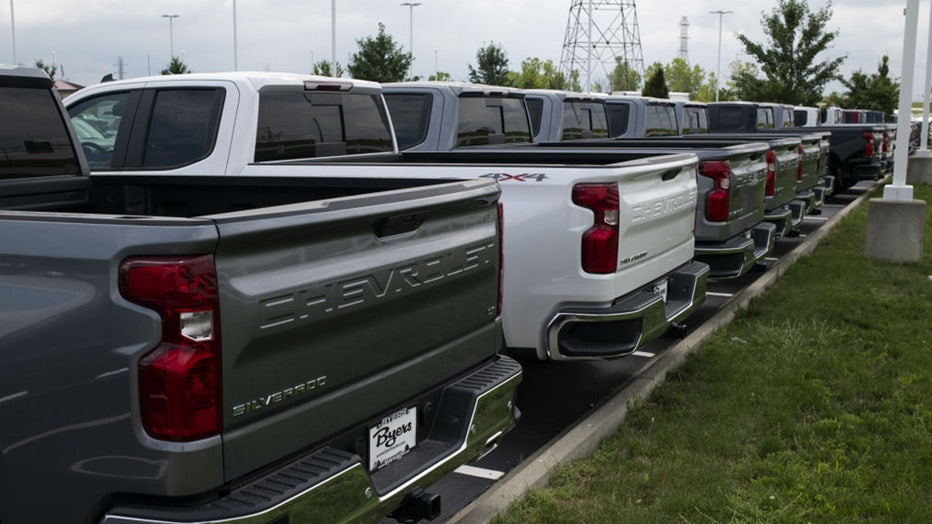
FILE - General Motors Co. Chevrolet trucks are displayed for sale at a car dealership in Grove City, Ohio, U.S., on Saturday, August 15, 2020. (Ty Wright/Bloomberg via Getty Images)
New or used
As for deciding whether to buy new or used, Drury said it all depends on your budget.
If a consumer is looking to buy a used car, hoping to save some cash, it might not be as cut and dry as one might hope.
The price of used cars nowadays have gone up around 30%-40%, according to Drury, and they are ranging in the low $20,000s.
And we’re talking maybe three or five years, which isn’t that old. A cursory search on Edmunds website shows that a 2019 certified used Honda Civic that has over 41,000 miles can sell for a little over $20,000.
But if you’re looking to go lower than $20,000, you will probably have to start looking at cars that are about 10 years old or older, and while this isn’t exactly a terrible investment, you’re probably going to have issues with the car sooner rather than later.
"So, if you start thinking used, you’re going to have to get to like a 10-year-old used car to find a $15,000 used car. And really, right now is one of the hardest times to buy a used vehicle because prices are just up so high that anybody who’s been out of the market for a little while, they’re finally coming back into car-buying mode, they’re going to be floored," Drury said.
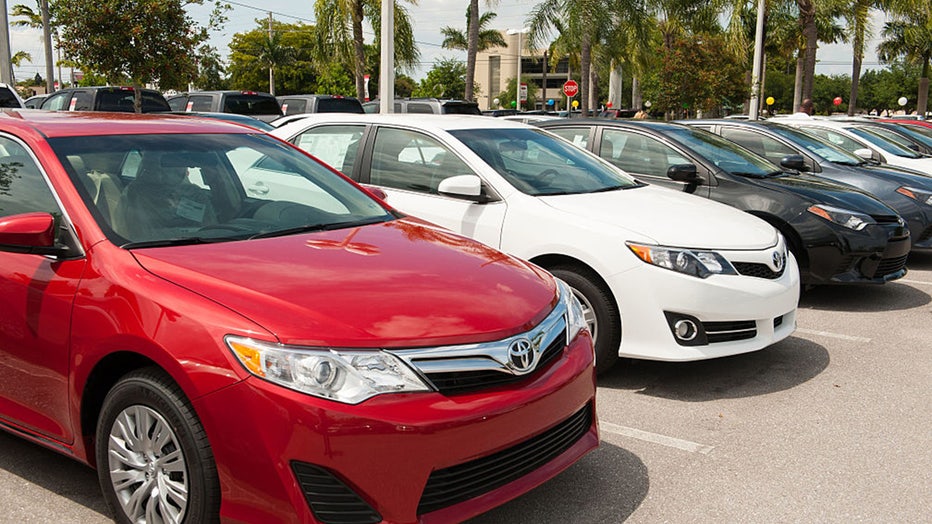
FILE - Different Toyota car models sitting on a lot. (Michele Eve Sandberg/Corbis via Getty Images)
"You’re going to have to readjust a lot of your thoughts about age and mileage, but the good thing is cars today are a lot more durable, they come with a lot better options so even if you have to concede an extra 20,000 or 30,000 miles beyond what you are initially thinking, you will still get a high-quality vehicle. The question is, can you stomach those prices," Drury added.
But buying new isn’t exactly a cakewalk either.
Prices for new cars are trending upward, like everything else.
"When you look at the new market, they’re finding out cars are selling at MSRP or above — which is unheard of," Drury offered. "Usually, that’s like sports cars, exotic vehicles."
"But today, it’s everything from the Honda Civic, Kia’s Telluride, this SUV that everybody wants, Cadillac’s Escalade; those are transacting $5K, $10K, $20K over MSRP. So if you go into the new car market, it is shock and awe for anybody who has ever bought a new car before. There’s like little to no discount, there’s not a lot of incentives for the vehicles; you’re going to find that it’s going to be you and about three other people looking at the exact same car for sale," Drury said.
A great resource: The automaker's website
When looking for the best options for financing a car, Drury said to look no further than the automaker’s website.
"It sounds kind of silly and some people don’t trust it nearly as much as they should but at the same time, that is where a lot of great information does live. They keep things as up-to-date as possible. That’s where you’ll find those incentives. If you’re really looking into saving some money, go to the automaker’s website, it’ll be under ‘specials,’ it’ll be under ‘incentives,’ it’ll be under ‘finance,’ it’ll be on their websites somewhere. You will find it, the verbiage might differentiate from one automaker to the next but they always want to get you use their incentives because most likely that means you’re going to finance with them, through the dealership and their captive auto finance company and that makes them more money but it also buys them a little bit of loyalty," Drury said.
If a consumer has a great experience buying a Toyota through a Toyota dealership and continues to purchase through Toyota, chances are the dealership will be able to offer the buyer great options for financing.
"They might be able to give you a 0% APR, 1.9% APR, or something like that. So, that’s the other good thing is if you do finance with them and you have credit that’s applicable to some of their incentives, you will absolutely get the best rates. No bank is going to give you free money. They’re not going to give you 0%, but an automaker will," Drury added.
Semiconductor shortage
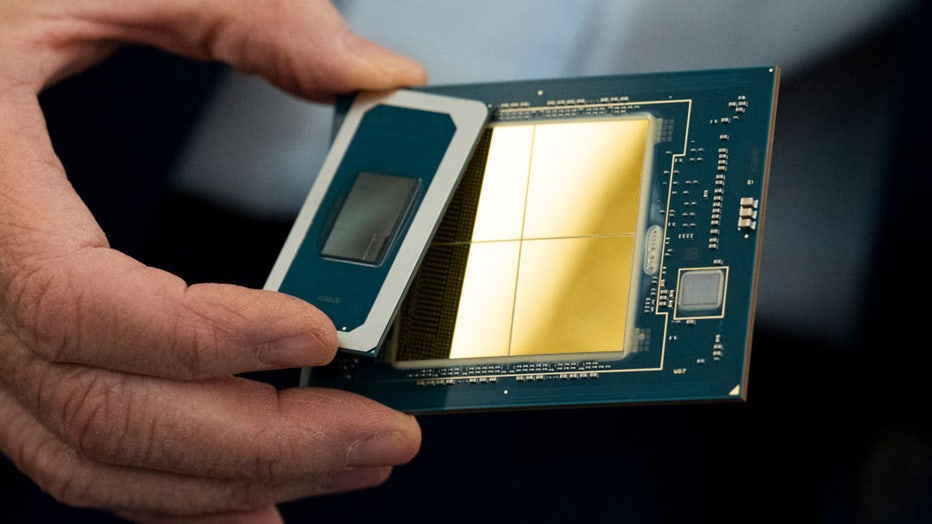
FILE - Chair Maria Cantwell , D-Wash., holds semiconductor chips while talking with Pat Gelsinger, CEO of Intel Corporation, before the Senate Commerce, Science, and Transportation hearing. (Tom Williams/CQ-Roll Call, Inc via Getty Images)
A unique aspect to consider when buying a new car now is the semiconductor shortage due to supply chain backlogs.
"That has taken a beating under normal sales patterns," Drury said.
Most people have become accustomed to short supply due to the COVID-19 pandemic. Remember not having any toilet paper?
But quickly, supply for bigger appliances such as washing machines, refrigerators and even cars were hit, vastly altering car-buying methods, Drury said.
"Cars were hit and it was about the smallest thing possible, the semiconductors, the chips that power everything from your rear entertainment system to your throttle position sensor. All these tiny little components of the car, they’re controlled by computers nowadays and there are hundreds of chips. So, if you’re just missing a few, it might be OK. You can get away with maybe not having the rear air conditioner working for a little while, they put a chip in and you’re fine. But if we’re talking about safety systems, we’re talking about drive by wire throttle, that is dangerous and they will not sell you a car," Drury continued.
Car inventory is down somewhere in the neighborhood of 80% to 90%, Drury estimated.
"So if you go to a car dealer’s lot, and it looks empty and all you see are the employees’ cars and other customers’ cars, that’s not a joke, that’s reality. It’s been that way for nearly six months. Inventory started going down about a year ago and they’ve been depleted ever since. So because of that, all of our normal car-buying behaviors have kind of gone out the door," he added.
Finding electric cars
If you’re in the market to buy an electric vehicle (EV), there are still many things to consider, such as the supply chain backlog and the filled reservations for 2022 models from automakers such as GM and Chevrolet.
"With these new EVs that are being launched, there were so many consumers that rose their hand and put down reservations nearly a year ago that, if you just hear about one of these new EVs, and you think you’re going to go to the dealer’s lot and get one - impossible. Unless you’re wanting to pay absurd markups, then it’s just not going to happen," Drury said.
New electric models that were announced for the 2022-2023 season such as Ford’s F-150 Lightning and GMC’s Hummer have already been spoken for, according to Drury.
"You’ve got people who are buying these cars well ahead of time. You are not just going to show up to the dealership and be able to buy one unless you guy it secondhand, and I guarantee you, in the used market, they’ll cost more than new because nobody can get their hands on one. You couple that together with semiconductor problems, there’s going to be even more of a backlog," he added.
But there are benefits to considering going electric, especially now with spiking gas prices.
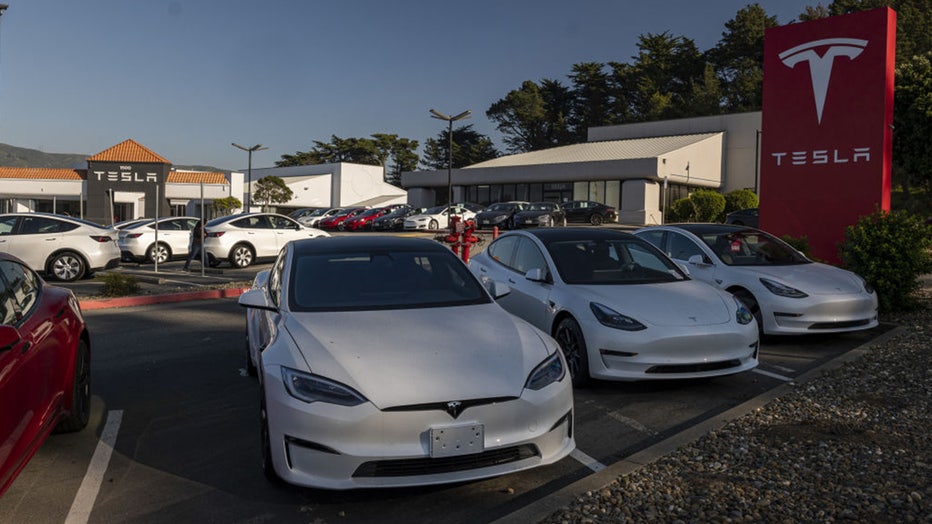
FILE - A Tesla dealership in Colma, California, U.S., on Wednesday, Jan. 26, 2022. (David Paul Morris/Bloomberg via Getty Images)
"We saw about 1 in 4 to 1 in 5 consumers go on our website and look at an electrified vehicle. So whether it was a hybrid or a plug-in hybrid or a pure EV, people reacted. Rightly so because now we actually have good enough offerings. Now if you look 10 years ago, you had to buy a Tesla, a Nissan Leaf or a Chevy Volt, they just weren’t going to cut it for you, range-wise. But today, easily get a 250-350 [mile] range vehicle and they are far more appealing," Drury said.
Right now, electric vehicle sales are still in the single digits but the number of people buying electric is slowly rising, according to Drury.
"You know back in the days, you’re looking at less than 1%. Nowadays, you’re looking at 3%-4% of the market. But thing is, they are the way of the future and I think once people actually drive one, they start to see the benefits. Once they start to own one, a lot of people, once they go green, they never go back. They really do enjoy the ability to bypass the gas station. It’s that simple time-savings of not having to make a left turn in their neighborhood that’s horrible to get to their favorite gas station or wait in the Costco gas line for 30 minutes to buy gas, is a huge deterrent," Drury added.
But Drury recognizes the naysayers and noted that not everyone can practically own an EV due to simply having to travel far distances or potentially needing more cargo space for work.
"There’s still development that’s going to happen there, but thankfully the automakers, that is their No. 1 priority and that’s every single automaker in the industry. So if right now you don’t see something from someone you like, don’t worry, wait a couple of years, it’ll be out there," he said.
This story was reported out of Los Angeles.

